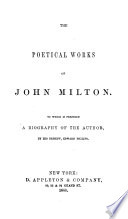 | Charles Stuart Calverley - 1866 - 306 sider
...Iseto Capripedes potuere diu se avertere Fauni ; Damoetasque modos nostros longsevus amabat. But oh, the heavy change, now thou art gone, Now thou art gone, and never must return ! Thee, shepherd, thee the woods, and desert caves With wild thyme and the gadding vine o'ergrown,... | |
 | New York Chamber of Commerce - 1867 - 632 sider
...MR. ELAM having never married, " Vaucluse " soon felt the loss of its master's tender care. " But (), the heavy change, now thou art gone ! Now thou art gone and never must return ! Thee shepherd, thee the woods and desert caves With wilde Thyme and the gadding Vine o'crgrown, And... | |
 | 1867 - 556 sider
...heel Prom the glad sound would not be absent long ; And old Damœtas loved to hear our song. But, О the heavy change, now thou art gone, Now thou art gone, and never must return ! Thee, shepherd, thee the woods, and desert caves With wild thyme and the gadding vine o'ergrown,... | |
 | Charles Bilton - 1868 - 216 sider
...the star, that rose at evening bright, Toward heaven's descent had sloped his westering wheel. . . . But, O, the heavy change, now thou art gone, Now thou art gone, and never must return ! Thee, shepherd, thee, the woods, and desert caves, With wild thyme and the gadding vine o'ergrown,... | |
 | John Milton, Edward Phillips - 1868 - 632 sider
...heel From the glad sound would not be absent long, And old Damaatas loved to hear our song. But oh, the heavy change, now thou art gone, Now thou art gone, and never must return ! Thee, shepherd, thee the woods, and desert caves "With wild thyme and the gadding vine o'ergrown,... | |
 | Robert Duncan - 1993 - 172 sider
...lament or celebrate a youth or age that yet shall not avail against the still unbroken universe of God. But O the heavy change, now thou art gone, now thou art gone, and we are set adrift in th'eclipse. Any wastes, like Carthage burnd & salted, cities of despair, are better... | |
 | Simon Bainbridge - 1995 - 292 sider
...tone of the passage evoke the literary tradition of elegy. We are reminded, for example, of Lycidas: But O the heavy change, now thou art gone Now thou art gone, and never must return . . . (lines 37-8, my italics) and: Shall no more be seen (line 43, my italics)'7 and of Lear grieving... | |
 | Carl R. Woodring, James Shapiro - 1995 - 936 sider
...clov'n heel From the glad sound would not be absent long, And old Damaetas lov'd to hear our song. But O the heavy change, now thou art gone, Now thou art gone, and never must retum! Thee shepherd, thee the woods, and desert caves. With wild thyme and the gadding vine o'ergrown,... | |
 | William Riley Parker - 1996 - 708 sider
...and rural ditties; he dared to express the age-old sense of loss in language plain and repetitious: But O the heavy change, now thou art gone, Now thou art gone, and never must return! Thee, shepherd, thee the woods and desert caves, With wild thyme and the gadding vine o'crgrown, And... | |
 | William Harmon - 1998 - 386 sider
...with cloven heel From the glad sound would not be absent long, And old Dametas lov'd to hear our song. But O the heavy change, now thou art gone, Now thou art gone, and never must return! Thee shepherd, thee the woods and desert caves With wilde thyme and the gadding vine o'ergrown And... | |
| |